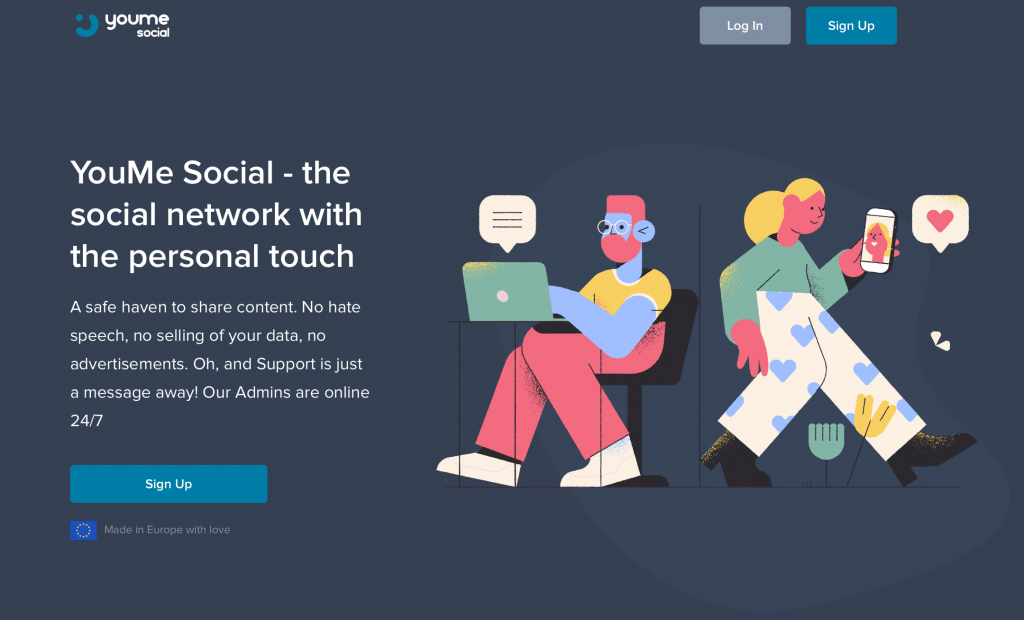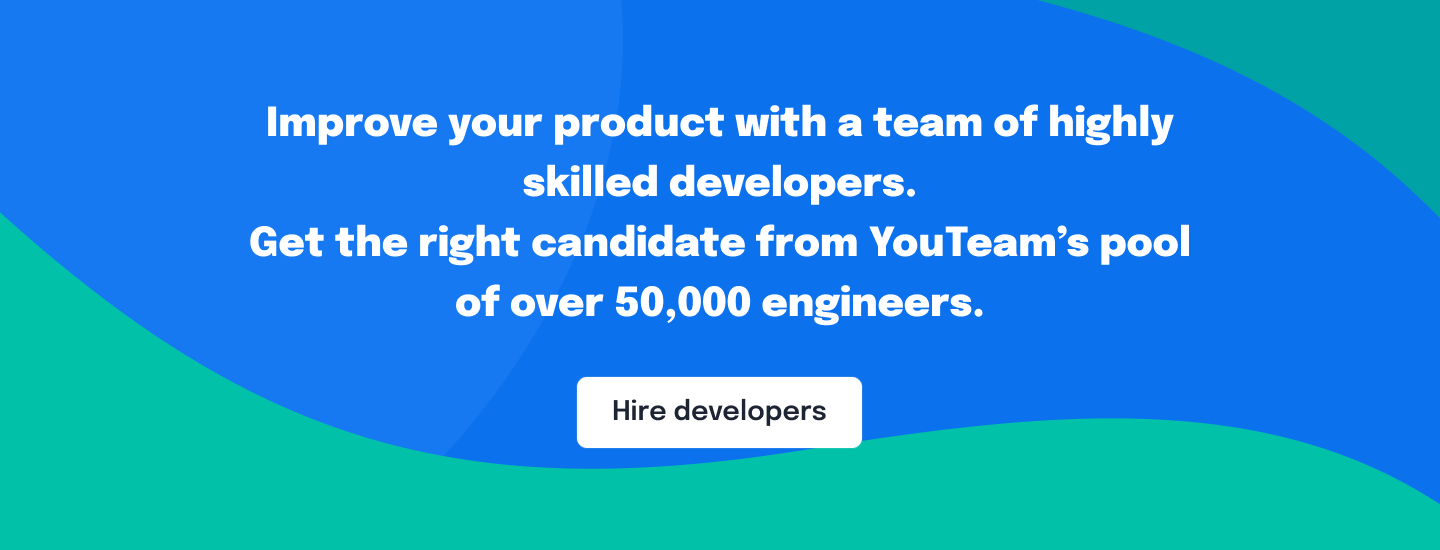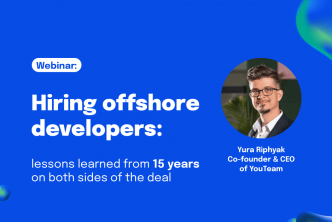Can you imagine a social network where you are not bombarded with advertising, your personal data stays personal, and there is no hate speech or fake profiles? It is called YouMe Social – a new generation social network with a personal touch. We interviewed Jamez Frondeskias*, the founder of YouMe Social and YouTeam’s client, to learn more about the product and his experience of working with remote developers.
*At the request of the interviewee, we are using his alias, not his real name.
YouTeam: First of all, thank you for taking the time and effort to participate in the interview. It is very much appreciated. Can you tell us a little bit about the beginnings of YouMe? How the idea for YouMe emerged? What were the first steps?
Jamez: Thank you for the opportunity! YouMe Social was a direct result of Google announcing it was shutting down its social media service Google+. Like most on Google+ at that time, I searched online for a social media site that was similar to Google+ but without any luck. So I decided to take the gamble of creating YouMe Social.
When the idea of the product turned into a wholesome plan, I started searching for developers who would turn YouMe Social into reality. Not being a programmer myself, I found a company that seemed to have an out-of-the-box approach to building social media sites. They did put in a lot of effort. However, it wasn’t what I was looking for. The feel and the look of the site just weren’t there, despite providing them with a clear outline with screenshots of what I wanted the site to look like.
YouTeam: How is YouMe different from other social networking sites? Is it aimed at any particular audience, let’s say Millennials?
Jamez: YouMe Social is very different from other sites. The moderators and I are active on the site and approachable from the start. Ideas for improvements and added features are members-driven. I actually encourage members to forward their suggestions to me, and to be honest, some of their ideas are fantastic. We also don’t data mine members’ details nor carry advertising. This allows us to provide our members with the privacy that is lacking in many other sites.
Jamez: We also have a zero-tolerance for hate speech, harassment, porn, spam, fake profiles, etc. and any other occurrences are dealt pretty swiftly. We are lucky to have the members who are also very proactive in reporting people who violate our terms and conditions. It helps a lot. We aren’t faceless behind the scenes moderators, unlike most other sites.
As an EU based site, Greek, in fact, we adhere to GDPR as well as the European Union’s Charter of Fundamental Rights, which is our proverbial guiding light on how the site works.
The target audience is ex Google+ers as well as people who value their privacy and want to be treated like people without worrying about being harassed, etc.
YouTeam: What is next for YouMe? Are there any plans you can share with us?
Jamez: Without giving away too much, YouMe Social will continue to evolve with new features and benefits for the members. At present, we do have an online store that offers branded clothing and accessories as well as offering hosting, banking, and VPN deals to our members. These benefits will expand over time with partnerships with other businesses.
We currently have an entirely free photo storage site for the members, and we are in the process of setting up an email service as well. The email service will provide not only free email accounts with a decent storage size facility but also a paid service that will give even more storage. The fine details of this are currently being worked out, and an announcement will be made soon.
There are also other services in the pipeline. However, those are not ready yet for public disclosure. So keep an eye out for announcements.
YouTeam: At what point did you decide to hire your first remote developer?
Jamez: Looking at the first version of the site, it was back in June 2019 when I realized that it wasn’t what I wanted. I then decided to find a remote developer to get down to rebuilding the site from the ground.
YouTeam: When you first started working with offshore developers, did you have any doubts about the quality of their work? How did it change over time?
Jamez: Honestly, I had a lot of doubts. They ranged from how do I protect myself from being scammed to making sure that they knew what they were doing. With member security being paramount and the legal consequences, if there was a breach, playing on my mind as I searched for an offshore developer.
The other thing was their commitment to the project that worried me. Things that I had to consider included what if they decide to stop working on the project halfway through? What if they close? A lot of what-ifs were on my mind. It was a gamble, especially when the project was going to cost a lot of money.
The process of finding an offshore developer was made easier by the fact that YouTeam actually sourced them for me.
YouTeam had the contacts and knowledge of who was out there. They organized video conference calls for me to discuss the project directly with the developers, provided me with their websites so I could see what work they had already done. YouTeam also dealt with contracts, payments, etc.
In the end, I particularly liked one dev shop that YouTeam offered, and it came down to three things. One, they were members of Google+, so when I told them what my dream was, they knew what I was looking for. Two, the dev shop was enthusiastic about doing the job and showed an active interest. You would be surprised by how some offshore developers I interviewed showed a lack of interest. Three, their commitment to regular weekly video conference calls to discuss the design and development as well as to make changes that I needed.
YouTeam: Why do you think so many startups are still afraid of hiring remotely? What prompted you to try offshore hiring?
Jamez: Probably the same ones I had. Will they do the job the way I want it done? Do they know what they are actually doing? What experience do they have? How can I trust them?
As I stated earlier, I had a dream, and I wasn’t a programmer. The only option I had was to either give up on my dream or hire someone who can build the social network for me.
YouTeam: What advice do you have for managers outsourcing product development for the first time?
Jamez: Find someone to act as the middle person, like YouTeam. When I took on YouTeam to find developers, I already had a proposal drawn up that not only listed my requirements in bullet points, but also clear images to show what the site should look like once completed. I also included in the proposal my budget and expected time frame.
Be open and frank about the whole project. If a developer doesn’t suit your needs or you have doubts, let YouTeam [in my case] know so you don’t waste everyone’s time. As I stated earlier, one of the developers I had a video conference call showed no interest, and I advised YouTeam immediately that I wasn’t going with them. The feedback is essential, so they know the reasons for not choosing them.
Make sure you have someone actively involved in the design and development of the site, someone within the organization that has the authority to make changes and put suggestions forward. In other words, don’t nominate someone to liaise with the developers if they have to keep coming back asking for permission or seeking advice.
YouTeam: What are the key points that have to be discussed before starting cooperation?
Jamez: Some of the key points that need to be discussed include:
-
- 1. How often will the conference calls occur?
-
- 2. How will the project be paid? Is it weekly, fortnightly, monthly? Will the payment go directly to the developer, or will it go through someone like YouTeam?
-
- 3. What processes are there in place to ensure the developer completes the project within the budget? What happens if they can’t/don’t?
-
- 4. What happens if there is a dispute between the developer and yourself?
-
- 5. After the site is completed, what support is offered?
YouTeam: Considering the latest events in the world, do you think that remote work and offshore hiring, in particular, will become more widespread?
Jamez: Definitely! Putting aside the health risks posed by the pandemic, I believe it will become more widely used. When you also consider cost savings to your business, no transport costs, no time out of the office, etc., and the fact that you literally have the whole world at your fingertips to source a developer, the benefits of offshore hiring become apparent.
Looking at my own experience, I have saved quite a few hundred, if not thousands of euros by outsourcing offshore.







